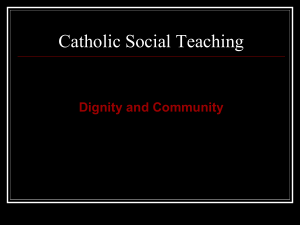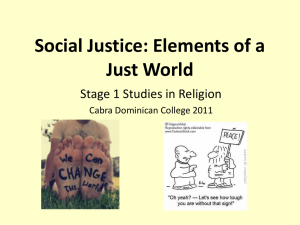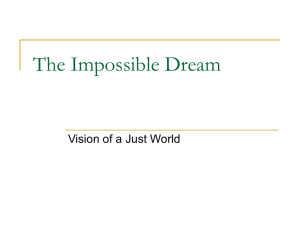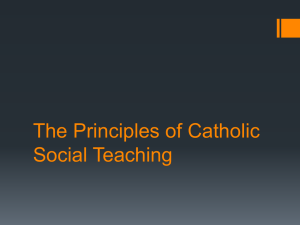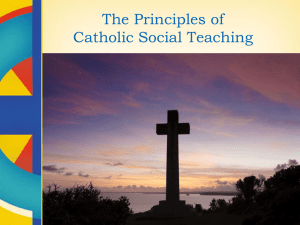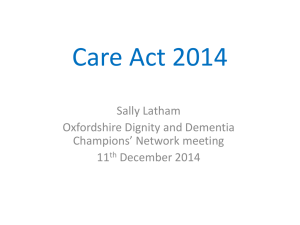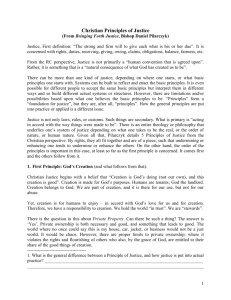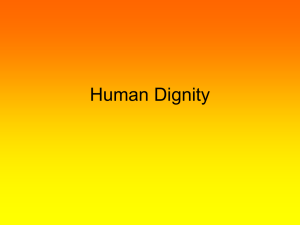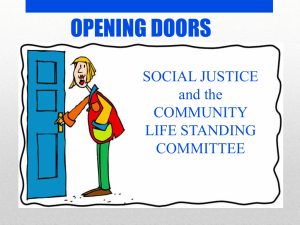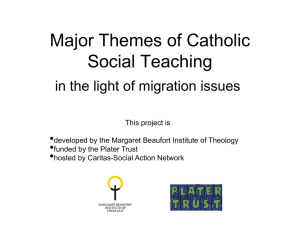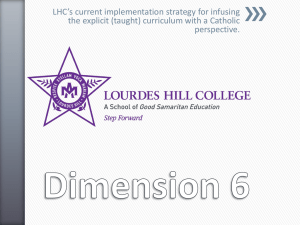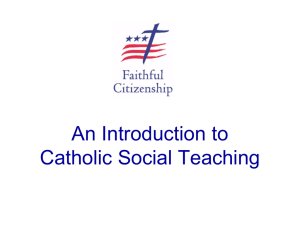Ten Major Themes for Catholic Social Teaching
advertisement
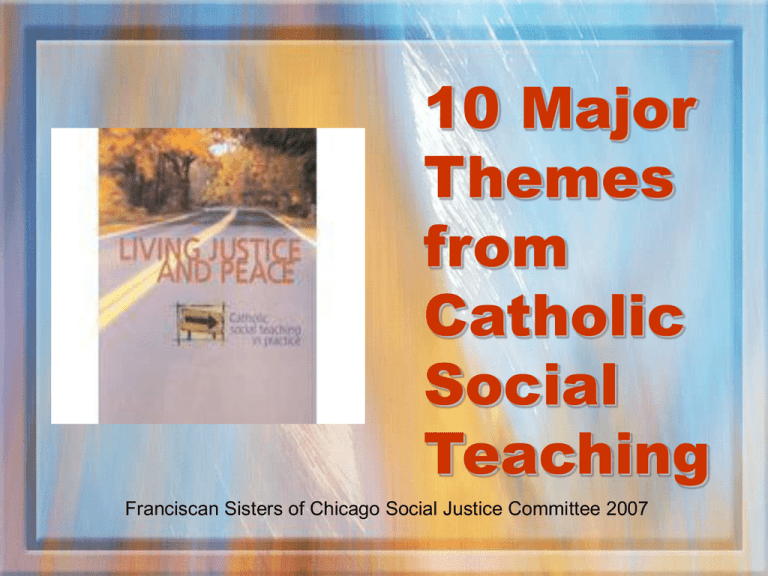
10 Major Themes from Catholic Social Teaching Franciscan Sisters of Chicago Social Justice Committee 2007 1. Dignity of the Human Person 1. Dignity of the Human Person • Belief in the inherent dignity of the human person is the foundation of all Catholic social teaching. 1. Dignity of the Human Person • Human life is sacred, and the dignity of the human person is the starting point for a moral vision for society. 1. Dignity of the Human Person • • This principle is grounded in the idea that the person is made in the image of God. The person is the clearest reflection of God among us. 2. Common Good and Community 2. Common Good and Community • The human person is both sacred and social. We realize our dignity and rights in relationship with others, in community. 2. Common Good and Community • The family is the central social institution that must be supported and strengthened, not undermined. 2. Common Good and Community • Human beings grow and achieve fulfillment in community. 2. Common Good and Community • Human dignity can only be realized and protected in the context of relationships with the wider society. 2. Common Good and Community • How we organize our society -- in economics and politics, in law and policy -- directly affects human dignity and the capacity of individuals to grow in community. 2. Common Good and Community • The obligation to "love our neighbor" has an individual dimension, but it also requires a broader social commitment. 2. Common Good and Community • Everyone has a responsibility to contribute to the good of the whole society, to the common good. 3. Option for the Poor 3. Option for the Poor • The moral test of a society is how it treats its most vulnerable members. 3. Option for the Poor • The poor have the most urgent moral claim on the conscience of the nation. We are called to look at public policy decisions in terms of how they affect the poor. 3. Option for the Poor • The "option for the poor," is not an adversarial slogan that pits one group or class against another. Rather it states that the deprivation and powerlessness of the poor wounds the whole community. 3. Option for the Poor • The option for the poor is an essential part of society's effort to achieve the common good. 3. Option for the Poor • A healthy community can be achieved only if its members give special attention to those with special needs, to those who are poor and on the margins of society. 4. Rights and Responsibilities 4. Rights and Responsibilities • Human dignity can be protected and a healthy community can be achieved only if human rights are protected and responsibilities are met. 4. Rights and Responsibilities • Every person has a fundamental right to life and a right to those things required for human decency – starting with food, shelter and clothing, employment, health care, and education. 4. Rights and Responsibilities • Corresponding to these rights are duties and responsibilities -- to one another, to our families, and to the larger society. 5. Role of Government and Subsidiarity 5. Role of Government and Subsidiarity • The state has a positive moral function. It is an instrument to promote human dignity, protect human rights, and build the common good. 5. Role of Government and Subsidiarity • All people have a right and a responsibility to participate in political institutions so that government can achieve its proper goals. 5. Role of Government and Subsidiarity • The principle of subsidiarity holds that the functions of government should be performed at the lowest level possible, as long as they can be performed adequately. 5. Role of Government and Subsidiarity • When the needs in question cannot adequately be met at the lower level, then it is not only necessary, but imperative that higher levels of government intervene. 6. Economic Justice 6. Economic Justice • The economy must serve people, not the other way around. 6. Economic Justice • All workers have a right to productive work, to decent and fair wages, and to safe working conditions. 6. Economic Justice • They also have a fundamental right to organize and join unions. 6. Economic Justice • People have a right to economic initiative and private property, but these rights have limits. No one is allowed to amass excessive wealth when others lack the basic necessities of life. 6. Economic Justice • Catholic teaching opposes collectivist and statist economic approaches. But it also rejects the notion that a free market automatically produces justice. 6. Economic Justice • Distributive justice, for example, cannot be achieved by relying entirely on free market forces. Competition and free markets are useful elements of economic systems. 6. Economic Justice • However, markets must be kept within limits, because there are many needs and goods that cannot be satisfied by the market system. It is the task of the state and of all society to intervene and ensure that these needs are met. 7. Stewardship of God's Creation 7. Stewardship of God's Creation • The goods of the earth are gifts from God, and they are intended by God for the benefit of everyone. 7. Stewardship of God's Creation • There is a "social mortgage" that guides our use of the world's goods, and we have a responsibility to care for these goods as stewards and trustees, not as mere consumers and users. 7. Stewardship of God's Creation • How we treat the environment is a measure of our stewardship, a sign of our respect for the Creator. 8. Promotion of Peace and Disarmament 8. Promotion of Peace and Disarmament • Catholic teaching promotes peace as a positive, action-oriented concept. In the words of Pope John Paul II, "Peace is not just the absence of war. It involves mutual respect and confidence between peoples and nations. It involves collaboration and binding agreements.” 8. Promotion of Peace and Disarmament • There is a close relationship in Catholic teaching between peace and justice. Peace is the fruit of justice and is dependent upon right order among human beings. 9. Participation 9. Participation • All people have a right to participate in the economic, political, and cultural life of society. 9. Participation • It is a fundamental demand of justice and a requirement for human dignity that all people be assured a minimum level of participation in the community. 9. Participation • It is wrong for a person or a group to be excluded unfairly or to be unable to participate in society. 10. Global Solidarity and Development 10. Global Solidarity and Development • We are one human family. Our responsibilities to each other cross national, racial, economic and ideological differences. 10.Global Solidarity and Development • We are called to work globally for justice. 10. Global Solidarity and Development • Authentic development must be full human development. It must respect and promote personal, social, economic, and political rights, including the rights of nations and of peoples. 10. Global Solidarity and Development • It must avoid the extremists of underdevelopment on the one hand, and "superdevelopment" on the other. 10 Major Themes from Catholic Social Teaching 1. Dignity of the Human Person 2. Common Good and Community 3. Option for the Poor 4. Rights and Responsibilities 5. Role of Government and Subsidiarity 6. Economic Justice 7. Stewardship of God's Creation 8. Promotion of Peace and Disarmament 9. Participation 10. Global Solidarity and Development Credits • Created by – Sister Jeanne Marie Toriskie, OSF, PhD – Susan Brunovsky, RN
